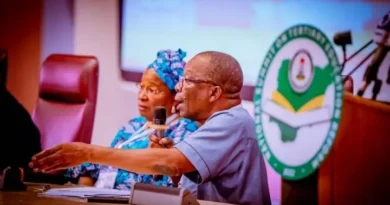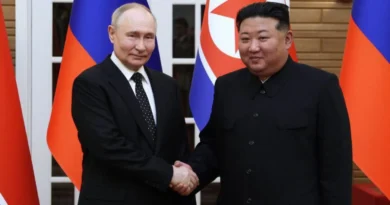Pope Francis rallies global leaders to support debt relief for poor countries
Pope Francis lamented that a “poorly managed globalisation” has deprived millions of people of a “dignified future.”
Pope Francis, Bishop of Rome, head of the Catholic Church and sovereign of the Vatican City State, has urged world financial ministers and leading economists to support an international mechanism to address the foreign debt crisis in the global south.
The Pope also lamented that a “poorly managed globalisation” has deprived millions of people of a “dignified future.”
Pope Francis made the remarks during the “Addressing the Debt Crisis in the Global South” conference, which was jointly organised by the Pontifical Academy of Social Sciences and Columbia University New York’s Initiative for Policy Dialogue (IDP). At least 50 finance ministers, economists, and heads of international development agencies attended the event.
“In the wake of mismanaged globalisation, and in the wake of the pandemic and wars, we find ourselves faced with a debt crisis that mainly affects the countries of the global South, causing misery and distress and depriving millions of people of the possibility of a dignified future. Consequently, no government can morally require that its people suffer deprivations incompatible with human dignity,” Pope Francis said.
Last year, a database released by Development Finance International showed that citizens of the Global South now face the worst debt crisis since global records began, with an average of 38 per cent of government revenue absorbed by debt servicing, rising to 54 per cent in Africa.
Matthew Martin, who presented the debt database to the International Monetary Fund at a Civil Society Policy Forum event during the October 2023 Annual Meetings in Marrakech, Morocco, noted that the figures are more than twice the levels faced by low-income countries before HIPC (Heavily Indebted Poor Countries)” initiative, where “debt service equals combined total spending on education, health, social protection and climate, and exceeds it by 50% in Africa.”
In his intervention, the Pope called for a new international financial architecture that breaks the financial debt cycle that has contributed to a current global debt estimated at $313 trillion.
He said that to break the debt-financing cycle, it is necessary to create a multinational mechanism based on the solidarity and harmony of people that takes into account the global nature of the problem and its economic, financial, and social implications.
“The absence of such a mechanism favours the mentality of “every person for himself or herself”, where the weakest always lose.
“In line with the teachings of my predecessors, I want to reiterate that it is the principles of justice and solidarity that will lead to finding solutions.
“On this path, it is essential to act in good faith and with truth, following an international code of conduct with ethical standards that can guide dialogue between parties. So let us think of a new international financial architecture that is bold and creative,” he said.
In her address, the Director of the Intergovernmental Group of Twenty-Four (G24), Iyabo Masha, said Pope Francis’ advocacy for a revamped international financial architecture to break the cycle of debt plaguing nations and thereby restore dignity and opportunity to millions couldn’t be more timely.
“For comparison, let us look back at twenty-five years ago. Following the debt relief programs at the turn of the century, many countries made real progress toward inclusive and sustainable development. More than a billion people escaped extreme poverty, and the global extreme poverty rate was cut by more than half.
“As countries invested in education, health, infrastructure and social services, public debt levels rose progressively in most emerging and developing regions in the decade leading up to the COVID-19 pandemic. Since 2020, economic upheavals brought on by COVID-19 and later the war in Ukraine produced an outright reversal of human progress,” she said.
To manage unsustainable debt burdens, she explained that countries are cutting back on key expenditure programmes, accumulating salary arrears and slowing down on progress towards the sustainable development goals.
She added that for some countries, public debt is largely held by non-residents in foreign currencies.
In Latin America, according to her, private bondholders are the single most important creditors.
She further explained that multilateral and bilateral lenders, by contrast, are the principal holders of the external debt of Asia and Caribbean countries.
“For many African countries, there is a strong mix of multilateral, bilateral and private sector foreign and domestic creditors. Regardless of the creditor class, the Global South faces a mounting debt crisis, and we can see the evidence from their debt burden, debt service costs, and mounting macroeconomic venalities.
“With high debt burden and high debt service, the macroeconomic time bomb is ticking. With rising vulnerabilities, new financing options are dwindling, signalling an extended period of crisis ahead,” she said.
She noted that many developing nations are increasingly borrowing from private lenders and hedge funds as access to markets from traditional sources closes.
She said this can expose them to more volatile interest rates and repayment terms, which can also complicate their economic conditions.
“Many are cash strapped, unable to raise domestic revenue and at the same time unable to access external financing. The fall in access to finance is contributing to weak growth, while higher interest rates and the risk of currency depreciation intensify the upward trend in debt levels.”
Ms Masha noted that high debt service is leading countries to face critical trade-offs between debt service and pursuing development objectives.
According to her, when these trade-offs are no longer viable, and market conditions deteriorate, a country may face a debt crisis.
“The world should not wait for that to occur. This is because debt crises provoke long-lasting development distress. Debt stress episodes are often followed by severe and protracted contractions in investment, economic activity (GDP) and consumption, in addition to deterioration in labour markets and increase in poverty rates,” she said.
She added that the G-24 endorses Pope Francis’ call for a reform of the international financial architecture to achieve debt relief for highly indebted countries.
She noted that the high public debt levels across developing regions and unfavourable global macro-financial conditions increase the urgency of transforming the international sovereign debt architecture to provide solutions aligned with sustainable development.
In this regard, she said debt reduction initiatives should not be “one size fits all” but rather tailored to countries’ economic vulnerabilities and debt profiles.
According to her, such initiatives should also consider the structural features of countries that are highly vulnerable to natural disasters and external shocks.
“Furthermore, the high level of indebtedness of many governments to their domestic banking system should be factored into any initiative if debt relief is to achieve a durable outcome. We believe that both creditors and debtors have crucial roles to play in the resolution of sovereign debt distress.
“The world cannot afford to wait,” she added.




